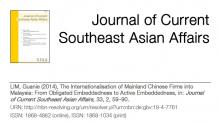The Internationalization of Mainland Chinese Firms into Malaysia

This paper examines the rationale by which mainland Chinese firms choose their coalition partners in their Malaysian ventures. I explore how, under certain political economic conditions, such cross-border investment and corporate tie-ups can be shaped to meet the Malaysian state's objectives. I argue that the Malaysian state has enjoyed success in the construction sector by nurturing cooperation between its carefully groomed government- linked companies and mainland Chinese firms. Government-linked companies are useful coalition partners for the mainland Chinese firms because of the crucial role the state plays in creating a largely non-competitive industry that favours government linked companies. Outside of the construction sector, however, the state has enjoyed markedly less success in fostering cooperation between the mainland Chinese firms and the government-linked companies. Consequently, the mainland Chinese firms possess more bargaining power vis-à-vis the state when they invest in these sectors, enjoying considerable autonomy in the selection of their coalition partners.
*This reading, accessible at http://journals.sub.uni- hamburg.de/giga/jsaa/article/view/776, is posted with the gracious permission of the Journal of Current Southeast Asian Affairs and the author. Copyright remains with the GIGA German Institute of Global and Area Studies Journal of Current Southeast Asian Affairs.
**Posting of this report does not represent an endorsement by the Mr. & Mrs. S.H. Wong Center for the Study of Multinational Corporations and has been done to facilitate research and promote debate about multinational corporations/FDI in and from East Asia.




